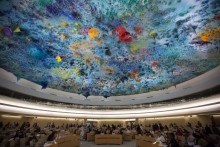Binding UN Treaty on Business and Human Rights

To date, enterprises have largely failed to comply with human rights regulated at the national level, let alone international standards. This is certainly the case when it comes to workers’ human rights. The UN Guiding Principles on Business and Human Rights (UNGPs) provide an important framework for demanding reforms of government and compliance by enterprises. However, very few governments have adopted National Action Plans to implement the UNGPs and they are often insubstantial. And enterprises continue to abuse human rights. A binding treaty on business and human rights will invigorate respect for the UNGPs, not hinder it.
PSI, the ITUC and the other Global Unions have prepared comments to the Zero Draft text of the proposed binding treaty that includes crucial provisions, which would represent a big step forward in ensuring corporate accountability throughout global supply chains:
- A requirement for businesses to adopt and apply human rights due diligence policies and procedures;
- A strong focus on access to effective judicial recourse for victims of human rights violations;
- A basis for “parent-based extraterritorial jurisdiction”, which will allow workers to have access to justice in the home countries of multinational companies; and
- Mutual legal assistance and international cooperation between states in transnational cases.
They are calling for improvements to the draft, including:
- A re-statement of the duty of businesses to respect human rights throughout their operations;
- Explicit recognition that human rights standards have primacy over trade and investment agreements;
- Alignment of due diligence provisions with the existing UN Guiding Principles on Business and Human Rights; and,
- Creation of a strong international enforcement mechanism beyond the frameworks which have been proposed so far for the Treaty.

